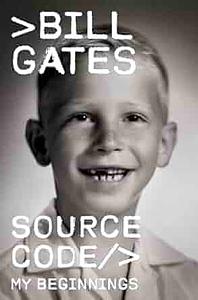Take a photo of a barcode or cover
slow-paced
There's no doubt in my mind that Bill Gates was always smarter than those around him. His intelligence, which led him to drop out of Harvard and co-found Microsoft, is the most interesting thing about him.
Most of the stories found in this memoir left me feeling bored and uninterested. The only story that captured my attention from Gates' childhood was when he brought a cow's lung to school for show-and-tell.
Perhaps those who have more interest in, or have a background in, computer technology or any related field would find this book more interesting.
Most of the stories found in this memoir left me feeling bored and uninterested. The only story that captured my attention from Gates' childhood was when he brought a cow's lung to school for show-and-tell.
Perhaps those who have more interest in, or have a background in, computer technology or any related field would find this book more interesting.
informative
inspiring
medium-paced
informative
inspiring
reflective
medium-paced
informative
fast-paced
informative
inspiring
medium-paced
slow-paced
informative
inspiring
medium-paced
adventurous
informative
inspiring
reflective
medium-paced
medium-paced
Bill Gates might be a pedophile, and that obviously casts a shadow over his whole moral character. Still, the connection between that fact and the subject matter of this book is quite tenuous. Nothing in Gates’s childhood foreshadows any misbehaviour in his later life, and none of the allegations against him have much relevance to his early life as a computer enthusiast.
Here are my main take-aways from this surprisingly enlightening text:
1) The most remarkable aspect of the book is just that it is any good at all. How exciting would it be to read a book about your life before the age of 20? By the time he got to college, Gates had engineered systems for payrolls, school timetables, and road traffic management. By the time he left college, he was leading a company which had created interpreters for all three of the major home computers then on the market, including the Apple 2. And only about half of the book is devoted to these exploits!
2) Gates’s story lends credence to the popular notion that gifted children often under-perform in school precisely because they find it too easy. Gates tested poorly and misbehaved as a kid, but once he was properly incentivized to excel academically, he did so immediately. Crucially, he had already been demonstrating excellence in other ways for years at that point.
3) My big take-away from the book is that there is a lot that goes into genius apart from IQ. Gates had a remarkable work ethic, an ability to focus well on little-to-no sleep, and an ability to accurately assess how much progress he could make at any given task within a given time period. He was also tenacious in getting what he wanted – knowing just how much he could bend the rules, or what he could achieve by applying a bit of creativity to a problem. Finally, and maybe most importantly, he was willing and able to direct his talents to where they would have the most impact: Gates was probably about as smart as his colleagues in Harvard’s elite mathematics class, but he knew better than to become a maths professor.
4) This is relevant to the debate over the relative merits of Gates and Jobs. The cliché is that Jobs was more creative, whereas Gates was more of a technocrat, but I think that’s only half-true. We might draw a distinction between Visionaries and Pioneers. Jobs was a Visionary – he had speculative bright ideas which he could summon into reality. Gates was a pioneer – looking first at the realities on the ground and then turning his eyes to what was just over the horizon.
5) Like many other geniuses, Gates also seemed to excel at basically everything he did, except athletics. In college, he took courses in subjects all across the spectrum of humanities and sciences and seems to have taken to all of them very easily. He was also apparently a gifted actor, an accomplished boy scout, and of course a savvy entrepreneur and manager. This isn’t in the book, but there’s even a video on YouTube of him jumping over a chair from a standing start.
6) The book does not give a clear answer to the nature vs nurture debate. It’s obvious that his immediate ancestors, particularly on his mother’s side, are all pretty impressive people. But it’s also clear that his relatives were also extremely devoted to nurturing his development at every stage.
7) In summary, Source Code exhibits just how much of an edge case Gates really is. He seems to have possessed every virtue and every fortuitous circumstance needed to succeed, and lo and behold he did indeed find a lot of success. This makes his story very impressive, but not necessarily very interesting. There may be more to learn from studying someone like Steve Jobs, whose success was more sporadic, and whose path into personal computing was less direct.
EDIT: As noted by another reviewer, Melinda French and Warren Buffet are not mentioned at all, including in the acknowledgements.
relaxing
medium-paced



